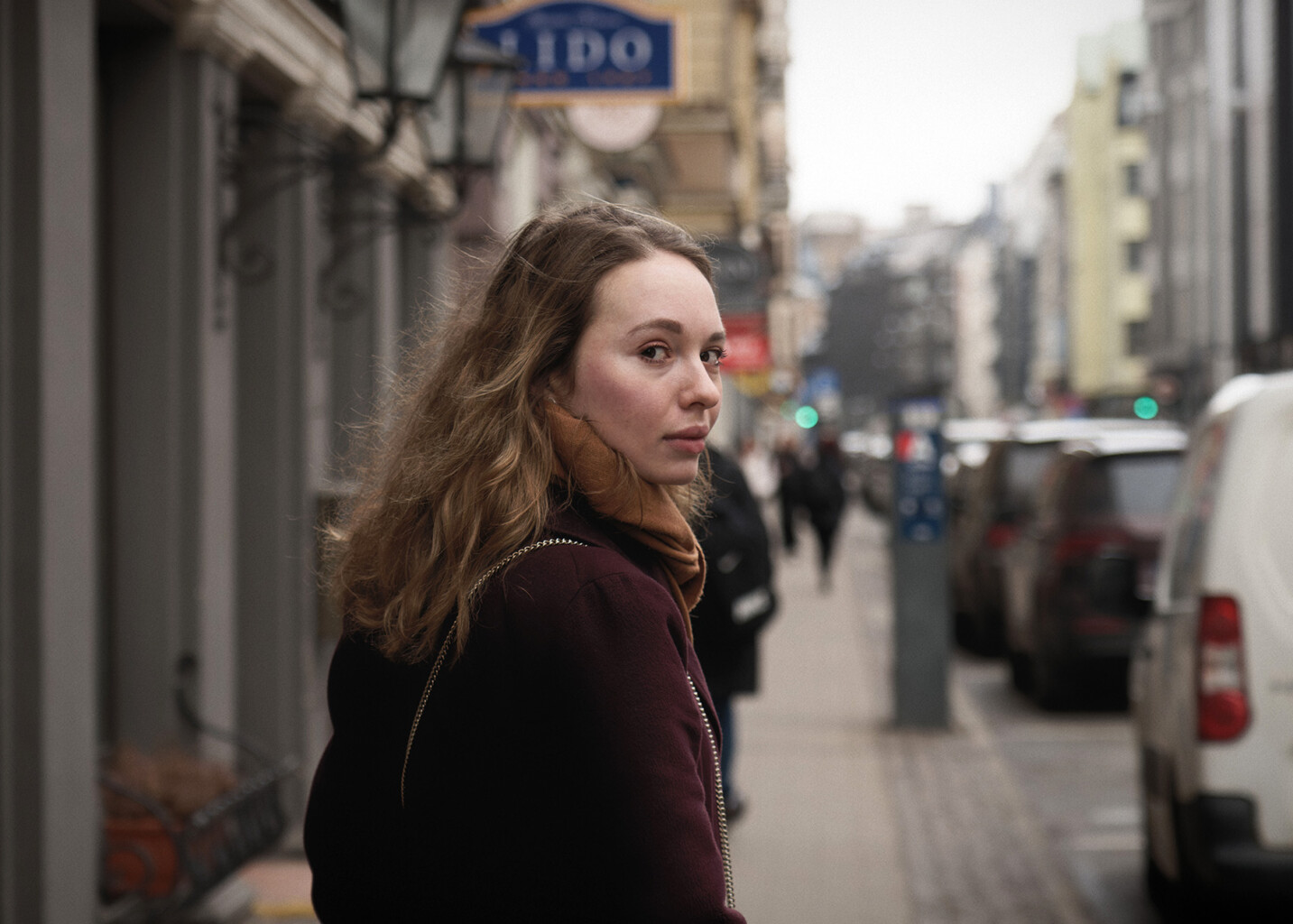Sign up for The Media Today, CJR’s daily newsletter.
On March 1, 2022, Valeria Ratnikova appeared on camera for her final broadcast in Moscow. Ratnikova, who was then twenty-two, worked for Russia’s only surviving independent television news channel, TV Rain, or Dozhd, in Russian. That morning, she awoke at four and dressed in a burgundy blazer. She ordered a taxi, which took her through Moscow in darkness and dropped her off in a vibrant neighborhood with hip cafés, galleries, and shops. She entered a converted glass factory that was home to TV Rain’s studio. An in-house makeup artist painted her face with a thick layer of foundation and lipstick that matched her outfit. Her blond hair, which fell below her shoulders, was immaculately curled, then tucked behind one ear. Ratnikova’s thoughts were fragmented. She felt nervous and unsteady.
Five days earlier, Vladimir Putin, Russia’s president, had declared war and announced a “special military operation” in Ukraine. Ratnikova responded with an overwhelming, amorphous grief. “You cannot just accept the things that are happening,” she said. “You can’t watch images of bombings going from your country to the neighboring country. It’s not normal.” She spent most of the following days crying inconsolably and shouting, “It’s the end!” She found solace by drowning herself in work, surrounded by colleagues. They hoped that Putin would allow TV Rain to remain operational; it was their duty to provide the public with the truth about the atrocities he was committing.
TV Rain was known for its unwavering coverage and sharp analysis, an island of reason in a sea of state-controlled media. Founded in 2010 by two women, Natalya Sindeveva and Vera Krichevskaya, the network attracted young reporters and anchors with an inclination toward defiance. “TV Rain gathered a lot of different people from different media,” Tikhon Dzyadko, who is now the editor in chief, told me. “All of them were really interesting people with hopes and ideas of making something fresh, something new.” Over the years, they confronted innumerable obstacles, including intimidation from the Kremlin, loss of funding, and eviction. For a time, they broadcast from a one-bedroom apartment in central Moscow. In 2021, the state designated TV Rain a “foreign agent.” Still, the network persevered. Now the coverage was a frenzy of war reporting; its YouTube channel had hundreds of millions of views.
That March morning, Ratnikova prepared a story on an internal directive she’d obtained about how teachers should discuss and justify the invasion with students. On air, as she spoke to the camera, she had a slight smirk. Recalling that segment, she remarked on her insouciance. “Maybe it helped me not to get mad,” she told me. After roughly twelve hours at the studio, flattened, she headed home.
Then a stream of news alerts appeared on Ratnikova’s phone. The Russian prosecutor general’s office ordered TV Rain’s website blocked. Ratnikova promptly turned on the newscast. Dzyadko was on air, reading from the prosecutor’s letter, which listed the grounds for the blackout: “intentional and systematic posting,” he began, “of content containing false information about the nature of the special military operation in Ukraine.” Ratnikova felt anguish overtake her and, in a haze of uncertainty, she fell asleep.
When she awoke, around 2am, dozens of TV Rain’s staff had gathered on Zoom. The mood was somber and confused; some staffers had children whose fate now seemed perilous. News had spread of the Russian parliament’s plan to pass a law imposing a jail term of up to fifteen years for spreading “fake” news about the military, and employees of TV Rain received credible tips, from disparate sources, that they could be criminally prosecuted. There was a tenor “of terrible fear and depression among colleagues, especially young colleagues,” Ekaterina Kotrikadze, the news director and anchor of TV Rain, told me. Kotrikadze and Dzyadko, who are married, began packing their bags and preparing their two children. They advised their colleagues to flee.
Ratnikova hesitated. Her close and extended family lived in Moscow. Just a few months earlier, she’d moved into an apartment with her boyfriend, building a nest that sequestered her from the near-constant risk of being an independent journalist in Russia. When the Zoom meeting concluded, Ratnikova received a private call from Kotrikadze. “Do you think I should really leave Russia?” Ratnikova asked. Kotrikadze responded decisively in the affirmative: “The government decided to destroy every free voice in Russia,” she said. Still, Ratnikova wavered. She consulted with her boyfriend. “If it’s safer for you, you should go,” she recalled him telling her.
Panicked, Ratnikova raced around her apartment, tossing clothing from her wardrobe onto the sofa. She felt as if she were watching herself act out a scene from a bad movie. Kotrikadze had advised her to imagine leaving for one week, no more, but Ratnikova understood that she’d need to pack outfits for different seasons. Still, her favorite dresses, which she thought might bring her joy in exile, took up too much space in her suitcase. She reasoned that she’d need her acne cleanser and tonic, along with her makeup. Her father helped her book and pay for a plane ticket to Istanbul, one of the few places in the region Russians can travel without a visa, and her boyfriend promised to join her in a week or two. Within hours, she was on a flight out of Russia, along with dozens of independent journalists who scattered across Europe, prophesying a similar destiny. “This was the most awful day of my life,” Ratnikova said.
In ninth grade, Ratnikova envisioned her future. She pictured herself on camera, live from the site of a historic event—like the Bolshoy Moskvoretsky Bridge in central Moscow, where, in 2015, Boris Nemtsov, a fierce Putin critic, was assassinated. Ratnikova grew up in the city; her parents worked in banking. The idea of a journalism career was abstract—her mother watched state television and her father consumed digital media. “No one knew what risks studying and making journalism would involve,” she said. When she entered the journalism program at Moscow State University, in 2016, her classmates turned her on to independent outlets, and she began reading Meduza, which was then perhaps the most respected Russian-language news website.
She soon began following Alexei Navalny—a vociferous opposition politician—including “all his investigations about officials in Russia with their houses and millions of rubles,” Ratnikova said. “Very quickly, I understood that something was wrong in Russia.” After Navalny produced a 2017 exposé, Don’t Call Him Dimon—a scathing film alleging that Dmitry Medvedev, who was then the prime minister, embezzled $1.2 billion—Ratnikova sat her mother and grandfather in front of the television and forced them to watch. “I tried to convince them that it’s a common thing,” Ratnikova recalled: oligarchs’ corrupt get-rich-quick schemes. Yet her mother was forgiving of Medvedev. Perhaps some powerful men could be legitimately wealthy, she suggested. “That’s the psychology of some people in Russia,” Ratnikova told me.
Around that time, Ratnikova’s classmates started attending anti-corruption protests. The demonstrations, led primarily by Navalny, were met with widespread detentions. For a while, Ratnikova “was too scared” to participate, she said. But in 2019, Ivan Golunov, a prominent investigative reporter with Meduza, was arrested and tortured by Moscow law enforcement for what his colleagues and friends considered trumped-up drug charges. Ratnikova decided then that it was time to get involved.
During her third year of journalism school, Ratnikova crisscrossed the country with a travel show. There were fancy meals and elegant hotels, but she found the work ill-suited to her evolving sense of purpose. “I thought, Okay, I want to get into political journalism,” she recalled. “I should look for some TV channel. And the only independent TV channel in Russia is TV Rain—there is no other alternative.” For her nineteenth birthday, Ratnikova asked friends for a subscription to TV Rain, which was then behind a paywall, and she became fascinated by its shows on feminism, propaganda, and politics. “That’s the place I should be,” she said to herself.

She started as an intern on Fake News, a program dismantling Russian state propaganda, and quickly moved up the ranks, reporting and, eventually, hosting. Her first major story, in 2020, was a thirty-minute piece about people who were swept up in terrorism-related charges for commenting online about a boy who detonated a bomb at an FSB office in Arkhangelsk. When the pandemic hit, Ratnikova traveled the country’s red zones, speaking with scientists and the public about the coronavirus. Once Russia’s Ministry of Health began conducting clinical trials for its Sputnik V vaccine, Ratnikova was one of the first members of the public to receive it. “She’s really a big star, and she is already a personality,” Kotrikadze said. “This is amazing, how a person now at the age of twenty-three can be such a good and professional reporter, a journalist asking questions, understanding the deep problems, a lot of details about complicated issues—and also, she’s a very good host for the news show. She knows how to talk to people, how to be objective, unbiased, how to be emotional when it’s necessary and how to be calm when it’s necessary.”
As Ratnikova’s face became more recognizable, the risks escalated. In the spring of 2021, Russia declared Meduza a “foreign agent”; TV Rain’s turn came soon after. Journalists who protested the decision were arrested. By the summer, Ratnikova felt her work becoming an all-consuming identity. She developed close bonds with her colleagues: “You are talking with them at work, after work, before work, and just all the time.” Often, they spoke about a shared sense of dread. “You always feel yourself in danger,” she told me. Sometimes, she would wake up at 5am, thinking that security agents were raiding her home. She would search her apartment, but it was always clear. Still, she considered hiding her devices, just in case. Her flat, on the second floor of an apartment building, overlooked the roof of a shop, and she found a crevice there in which to conceal her phone. “Because of all the news, I thought about it all the time,” Ratnikova said. “Now I understand that maybe this life was too much.”
Ratnikova landed in Istanbul with two suitcases. She was overwhelmed by the congestion and noise; it seemed to be a city that “doesn’t accept you if you are not stable, if you’re not ready,” she said. After a few days, sitting in a café, she called her parents to confess that she would not be returning to Russia. Her father quickly understood, but her mother was stricken, and harder to assuage. Ratnikova told them that she planned to travel to Tbilisi, Georgia, where scores of anti-war Russians had fled following the invasion. Some of her colleagues were there, figuring out their next move. It was impossible to see her future, but this way, at least, she could open a bank account, meet up with Russian-speakers, and wait until TV Rain got back on its feet.
She knew Tbilisi was temporary, but Ratnikova did her best to establish a semblance of normal life there. She made friends and traveled across Georgia, which contains the picturesque Caucasus Mountains and Black Sea towns. She imagined reuniting with her boyfriend. She envisioned the war ending. The reality, though, was unrelenting. By April, video footage emerged of the Bucha massacre, a mass murder of Ukrainian civilians and prisoners of war by Russian armed forces. Then Ratnikova’s boyfriend told her he wasn’t going to move to be with her; their relationship was over.
In May, Ratnikova learned that she would be moving again, this time to Riga, Latvia, where TV Rain planned to set up a studio in exile. After Russia invaded Ukraine, Edgars Rinkēvičs, Latvia’s minister of foreign affairs, had tweeted his support for Russian journalists. “As #Russia closes independent media and introduces complete censorship, I reiterate Latvia’s readiness to host persecuted Russian journalists and help them in any way we can,” he’d written. Latvia wasn’t offering the right to work, but members of Russia’s independent media could get temporary humanitarian visas. TV Rain would take that deal. “Latvia is Russian-speaking,” Kotrikadze said. “Latvia is very close mentally to us, and it’s comfortable.”
TV Rain would be able to broadcast on its YouTube channel—which viewers back home could access by VPN—and on Latvian cable. But starting over abroad came with challenges. In 2014, when Russia annexed Crimea from Ukraine, Galina Timchenko, a well-known Russian journalist, launched Meduza from Riga, while its journalists reported from Russia, and “pioneered the model of reporting from exile,” as Masha Gessen wrote in The New Yorker. In the months following last year’s invasion, Latvia issued nearly five hundred visas to journalists and their immediate family members, making it perhaps one of the most populous hubs of independent Russian journalists in exile—all striving to re-create and concretize Timchenko’s approach. “It was a trickle, and then it became an exodus,” Sanita Jemberga, the executive director and editor of the Baltic Center for Investigative Journalism Re:Baltica, told me.
Latvia’s history, according to Viktors Makarovs, a senior foreign-ministry official, made that scenario possible. Latvia was occupied by the Soviet Union for about fifty years; early on, tens of thousands of Latvians were deported en masse to remote, inhospitable areas of the USSR; later, there were immigration waves from Russia and Soviet countries into Latvia. Latvia’s demographics transformed. “To Russians, including independent media people, Latvia is a place they know,” Makarovs said.
Nearly all of those journalists received assistance from a Latvian woman named Sabine Sile, the former head of the media studies department at the Stockholm School of Economics in Riga, who set up an emergency support program, Media Hub Riga. Sile’s team helped exiled reporters with relocation costs, immigration requirements, mental health needs, and legal representation. “They never kind of asked, ‘Please help us,’ because it’s a tough place to be,” Sile said. Thanks to sanctions, “even if you have money in Russia, you cannot access it or use it in Europe.” When Ratnikova arrived—in July, two days before TV Rain officially launched from Riga—Media Hub Riga had a room waiting for her in a comfortable mid-range hotel in the city center. Ratnikova was fed breakfast and dinner and provided a local SIM card.

Within a week, thanks to Sile’s team, Ratnikova found an apartment. She began pouring herself into work, as TV Rain “tried to build something again.” The network went live from the studios of TV3, a station on the outskirts of Riga. As Ratnikova spoke into the camera, she imagined that she and her Russian audience were separated by a large concrete wall; she considered it her job to destroy the barrier so information could seep through. She came to enjoy Riga, with its temperate weather and majestic architecture. It felt miraculous that the powder sand beaches of the Gulf of Riga were accessible by a short train ride. “I needed to think about this place as a new home,” she said. “I needed to pretend.”
What Ratnikova didn’t know was that, although the Russian press had received a public welcome, Latvians were divided. Some had hostile feelings toward their new neighbors. “Looking back, I would say Latvia as a country was not ready for what it was offering—refuge—for these Russian media exiles,” Jemberga told me. Since the beginning of the war, “the borders of freedom of speech narrowed for everyone,” she said. Then TV Rain came and “tried to walk an impossible tightrope.” Whatever TV Rain’s expectations had been, Jemberga observed, “in this heightened environment,” where Latvian public opinion was sharply against the Russian government, “it was a predictable mutual disaster.”
Walking through quaint streets lined with medieval and Art Nouveau buildings, Ratnikova found herself confronted by ubiquitous reminders of the war: throughout Riga, Ukrainian flags were displayed in the windows of businesses and on the facades of public offices; a special tram decorated in yellow and blue ran through town. Ratnikova felt she was being stared at. On social media, Latvians criticized TV Rain’s coverage of the war, accusing its journalists of being pro-Russia. Within weeks, the station started racking up warnings and violations from Latvia’s electronic-media regulator, accruing thousands of euros in fines. Latvian authorities reprimanded TV Rain for failing to follow a law mandating that content be dubbed in Latvian; a presenter displayed a map of the Crimean Peninsula depicting it as Russian territory; and its journalists referred to Russian armed forces as “our army.”
In August, Kotrikadze interviewed the mayor of Riga about the preservation of Soviet-era monuments to the Second World War. A scandal erupted: locals attacked TV Rain’s journalists for meddling in internal affairs; a well-known filmmaker called for TV Rain’s expulsion. As Latvians became louder in their opposition, the staff of TV Rain, new to democracy, interpreted the criticism as legitimate difference of opinion—something they ought to get used to. “We really didn’t think this reaction could be something harmful and serious for us,” Ratnikova said. In September, TV Rain took a strong stance on the rights of Russian civilians; Kotrikadze was outspoken about her disapproval of Latvia and the other Baltic states closing their borders to Russian tourists. “We do not think that in the twenty-first century,” Kotrikadze began, “you can collectively blame a hundred and forty million people.”
That degree of nuance provoked discomfort. “Especially if you are so close to the war zone as Latvia, as the Baltics are, there is this very huge demand in society that you take sides—and there are only two sides,” Gunta Sloga, a Latvian investigative journalist and the executive director of the Baltic Centre of Media Excellence, told me. For many who endured the hardship of the Soviet era, it was difficult to distinguish Putin from the Russian people; after the invasion, it felt almost taboo to ask critical questions of Ukraine. “You see that media are under this pressure,” she said. TV Rain was unprepared for that dynamic. “We didn’t pay enough attention to the consequences of Latvia and its connections with Russia and its history and occupation issues—and a lot of wounds and traumas that Latvia is still fighting,” Kotrikadze said. “We were concentrated on the war in Ukraine and the relaunch of our television station, and we missed this.” She added, “There was not enough space in my head.”
On December 1, Alexey Korostelev, a TV Rain journalist, hosted a show called Here and Now from Tbilisi and, while filling airtime, said, “If you have any tips or witness accounts to share about the draft and the conscripts’ experience in the armed forces and at the front line, and if you’d like to discuss the problems in the Russian military, then contact us.” He continued, “We hope that we’ve been able to help many servicemen with their gear, for example, and basic necessities at the front, because the accounts that we have published and that have been shared by their relatives are frankly horrifying.”
Ratnikova, who had not watched the broadcast, awoke the next morning to a flood of messages and social media posts calling TV Rain journalists occupiers and Kremlin agents. She and her colleagues gathered on a call, and management announced that Korostelev would be fired. The team discussed the probability that they would be forbidden from operating in Latvia. Ratnikova was “crushed,” and saddened that her friend was losing his job. “I could not even imagine—that a person who left Russia because his views are not acceptable there, and here again, he is ‘an occupier,’” she said. Within days, the National Electronic Mass Media Council of Latvia revoked TV Rain’s license, calling its actions a threat to national security. (With the help of local NGOs, TV Rain is challenging the basis of the license revocation in Latvian courts.) Then TV3 asked TV Rain to leave its studios. “Everything was so absurd,” Ratnikova told me. “We didn’t understand why it happened—just in one day, everything you build for months was ruined.” More than that, she said, “I was ruined.”
Journalism in Russia, including independent journalism, has grown out of an environment characterized by challenges and paradoxes. According to Kevin Rothrock, the managing editor at the English-language edition of Meduza, most members of Russia’s free press have traditionally resisted defining themselves as “opposition” journalists, preferring instead to call themselves “independent.”But recently, “that’s not really how it works,” he said. Many sense that there is an inherent bias applied to them: “the idea being that you’re all compromised somehow.” He added, “There’s now a greater moral imperative to telegraph positions against the invasion of Ukraine and the Putin regime.” Sile told me that, for Russians, “just being an independent journalist, you are regarded as an activist and seen as opposition.” When I spoke to Ratnikova about how she viewed her work, she replied that objectivity is a reasonable aspiration for a journalist, but she has come to feel that it’s impossible to pretend to be neutral in a time of war.
On December 7, the day after Latvia’s regulator stripped TV Rain of its license, Sile received a call from someone at the network asking for help. The message was: “People are breaking down.” To Sile, the situation seemed to have mushroomed because “a large proportion of society in the Baltic states and post-Soviet space and Russia are not media literate” and there had been a misplaced expectation from Latvian politicians that the Russian press would end the conflict. “There is no room for error,” she said, “both due to the context of them being from Russia and the context of the ongoing war.” When TV Rain challenged Latvia’s narrative, the media regulator overcorrected, Sile told me; the decision was soon seen as political. TV Rain—along with other exiled Russian journalists—was suddenly faced with a choice: adapt or unravel.
Sile gathered two colleagues, Gita Ozola, who specializes in mental health, and Badri Simoniia, Media Hub Riga’s technical director, to visit TV Rain. The network had yet to leave TV3’s studios. A staffer stood outside, on her phone, crying; inside, a manager wept. “When we walked into the office, you could feel the desperation and stress in the air,” Sile said. Members of the staff expressed fear of being deported. Sile’s team offered them access to fully covered mental and physical health support. Ratnikova listened quietly. Later that day, she sent Sile a message over Signal inquiring about a therapist consultation. “I decided to go to a psychotherapist for the first time in my life,” Ratnikova told me. “I understood that it’s impossible for me to go through it by myself a second time,” she said. “It seemed to me that it’s really the end again.” She got an appointment and was prescribed antidepressants. “The pills helped,” she said. “I feel nothing.”
A year after the invasion, Ratnikova was among many exiled journalists going through similar challenges. “There are more and more cases of people losing the will to live in a very real way,” Sile said. “The younger media workers are struggling the most.” Media Hub Riga had set up a coworking space in an unmarked building, a sort of newsroom-in-exile with desks, private rooms, recording studios, and a kitchen that often contained a spread of local snacks. At one point, the organization hosted a series of intensive rehabilitation programs for about a dozen members of the Ukrainian and Russian press, who were tested for symptoms of post-traumatic stress disorder. All of them indicated high levels. “The rate was the same as veterans of war,” Sile told me.
Something that weighed heavily on Ratnikova was that she was receiving attacks from all directions. “We can be enemies for each side,” she told me. “For the Ukrainian side because we are Russians. And we are enemies for the Russian side because we do not want Russia to be successful in that war.” The criticism was public and persistent. “Before, when I was working as a journalist, I always understood I’m on the right side,” she said. “I understood: Okay, my state is against me, but that’s because the authorities are on the bad side of history.” Lately, though, the external sources of validation she’d come to rely on were scrambled. “Not all people on this right side trust me, because they say to me, ‘You are Russian, you cannot be good, you cannot be with us,’” she said. “And that’s a new thing.” She has become mercurial with herself. “Where should you go? Who should you be?” Ratnikova wonders. “This question—‘Who am I?’—it’s a frequent question that I ask myself.”
With Media Hub Riga’s support, TV Rain rented an apartment downtown that functioned as a makeshift studio. The former living room held the newsroom’s nineteen computers; a bedroom was now a technical room; and a second bedroom served as a small studio. The kitchen became a private meeting space, with people coming and going for coffee and tea.
When I visited, Ratnikova was reporting a story about a skirmish at the Russia-Ukraine border. During a break between calling sources and an editorial meeting, she ate pasta salad, her face still heavily made up from the morning’s broadcast. “During this year, I’ve changed, like, three times, maybe even four,” she told me. She recounted the places she’d lived since fleeing Russia. In a few weeks, she would relocate to a fourth city, Amsterdam, where Dutch regulators issued TV Rain a broadcasting license. The network was preparing to set up a new headquarters-in-exile. “Now I just don’t care where I live,” she said. “I don’t see any difference, because I see the best place for me is still at home.”


Ratnikova has long days at the studio, sometimes starting before sunrise and ending after sunset. During her off time, she calls friends and family, separated by borders, via Telegram. Will she ever see them in person again? “I just try not to think about it too much, because I cannot manage it,” she said. “Not to be too sad.” Recently, she started seeing a fellow journalist who lives in Israel. They had struck up a conversation virtually post-invasion and developed a bond over their months in exile. “Everything is very strange,” she said. “I could never imagine myself in some distant relationship before.” Now she felt she had to accept her circumstances. “We should just find some things that can give us at least some joy.”
Ratnikova regularly goes to a local gym, where she takes yoga and fitness classes, which help “normalize the reality when it’s not normal.” She has started going to the cinema to watch Latvian and American films subtitled in Russian. She tries to enjoy nights out as any young person might. She is not supposed to mix alcohol with her pills, though she told me that “sometimes I do it,” and broke out in a sly chuckle.
As Ratnikova’s personal life has drastically shifted, so have her ideas about journalism. When she started at TV Rain several years ago as a budding reporter, Ratnikova felt inspired by the idea that she could help drive people away from state television and participate in a type of deprogramming. Now, however, her distance from Russia and the overwhelming might of Putin’s propaganda machine have made her pessimistic. She’d hoped that, as a member of the independent press, she could deliver truth to her country. “When the war started, we understood we failed this goal,” she said. “It was not enough.”
Has America ever needed a media defender more than now? Help us by joining CJR today.



